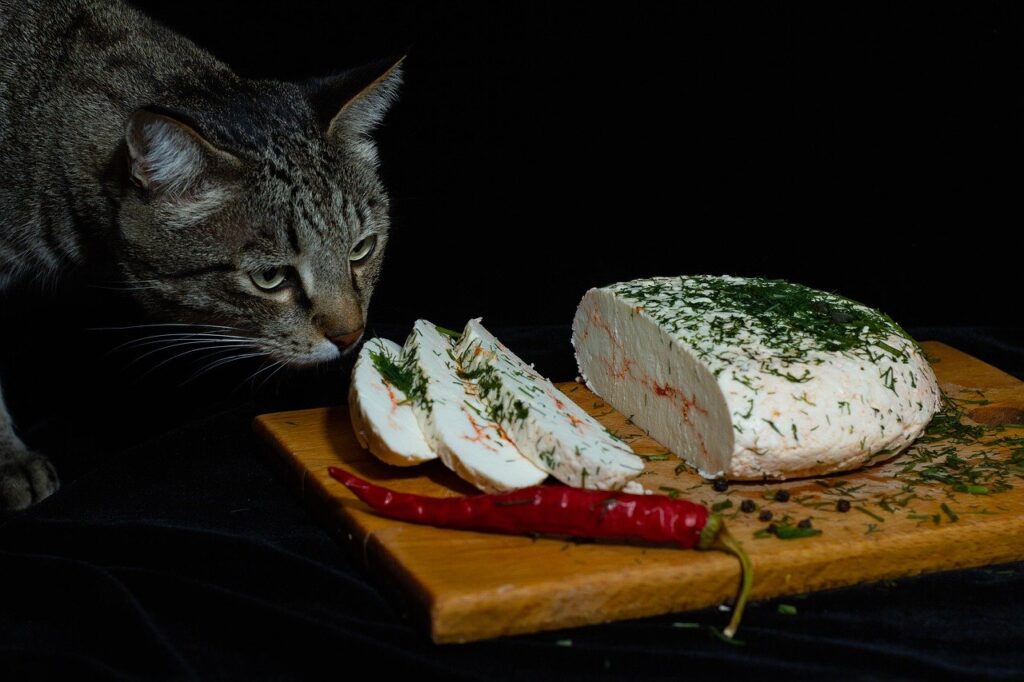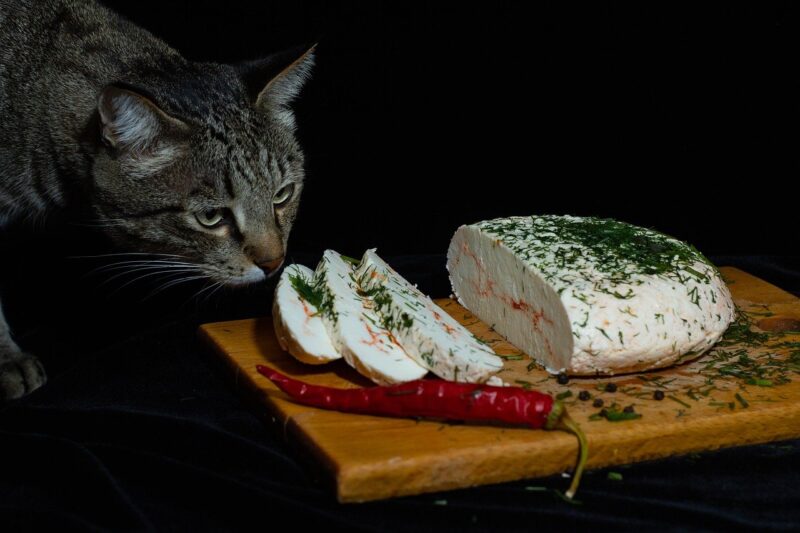For cats, cheese is a delicious snack, and it is also high in protein and fat content. Many cat owners know how their feline friends would go crazy whenever they smell the aroma of cheese. In a second, they’ll be next to you, waiting for you to give them a cube of this salty treat.
However, is cheese safe for cats? What kind of cheese can they eat? Is it possible to have it as part of their usual diet, or is it the other way around? Read on to find out all the answers to these questions.
Can cats eat cheese?
Depending on the cat’s health, he may or may not eat cheese. Suppose your cat is lactose intolerant, suffering from milk allergy, or suffering from certain health conditions that prohibits him from eating dairy products. In that case, he should not consume cheese and other dairy products.

On the other hand, if the cat is healthy and shows no signs of allergy to dairy products, then a moderate amount of cheese should be safe for them to eat.
When is cheese bad for cats?
Cats are carnivores, which means that their diet should consist of meat. Their digestive system is not designed to eat dairy products, including milk, cream, or cheese. While some cats can eat cheese occasionally, others should not take it at all.
Cheese is bad for cats when they are lactose intolerant or are suffering from milk allergy because this could lead to digestive problems, including constipation, diarrhea, inflammation, and vomiting.
Even if your cat is healthy and is not showing signs of dairy allergy, it is still important that you know first if there are added ingredients to the cheese. This is because some human foods are toxic to cats. You must avoid giving your cat those cheese with onion, garlic, or chives.
Read also: Some human foods your cat should avoid
How do I know if my cat is lactose intolerant or is suffering from a dairy allergy?
If it is your first-time feeding cheese to your cat and you’re not sure if he is allergic to dairy or not, then you will need to give him a small cube first, about the size of dice. Cats suffering from dairy allergies may react quickly, even on a small amount of cheese.
After consuming dairy products, you could look out for these signs to know if your cat has a dairy allergy:
- Abdominal pain
- Diarrhea
- Bloating
- Excessive gas
- Vomiting
- Itchy skin
- Increased heart rate
- Constipation
- Dehydration
- Dry gums
My cat accidentally ate cheese. What should I do?
If you later find out that your cat has eaten cheese, the best thing you can do is not to panic. Even the most diligent pet parent cannot have their eyes on their feline friend all the time, so it is important that you stay calm and get a hold of the situation.
If your cat shows one or more of the symptoms mentioned above, you should bring them to the veterinarian for a check-up as they would know best how to treat your cat. Also, do not try to fix the situation yourself, especially if you do not have enough information to handle such cases, as it could only worsen the situation. Instead, let the experts do their job.
What types of cheese can cats eat?
If you figured out that your cat is healthy and can safely eat cheese, it might lead you to the following question: can my cat eat all types of cheese? If not, then what kind/s of cheese can they eat?
Below are some common types of cheese, whether they are recommended or not, to be given to your cat:
Blue cheese
Blue cheese is created with cultures of the mold Penicillium. This can be toxic to pets, including cats, and therefore should not be given to them even in small amounts.
Brie
Brie is made using raw milk containing Salmonella and Listeria. It can be dangerous to your cat’s health. Because of this, brie should not be fed to cats.
Cheddar cheese
Perhaps one of the most popular cheeses, cheddar cheese, does not contain much lactose compared to other cheese varieties. However, they should still be taken in moderation.
Goat cheese
Among all cheese varieties on this list, goat cheese contains the least amount of lactose and salt, making it the “safest” cheese that cats can consume.
Mozzarella cheese
Mozzarella cheese is popularly used in sandwiches and pizzas. This soft cheese, cottage cheese, and cream cheese should be avoided because they are high in lactose.
Non-dairy cheese
If the dairy content in cheese is what makes it not ideal for your cat to eat, then what about non-dairy cheese? Non-dairy cheese should not be given to cats because they are high in salt and sodium, which can risk your cat’s overall health. Some may even have additional ingredients and flavors that may be toxic to cats.
Parmesan cheese
Parmesan has less lactose compared to soft cheese. However, they should still be given in moderate amounts only.
Swiss cheese
Usually used in sandwiches, swiss cheese is a healthy type of cheese because it is high in protein but low in fat and sodium. This is also low in lactose but should still be given in moderation, like cheddar.
How to feed cheese to cats
As previously mentioned, cats should only eat cheese in moderation – remember that this is only applicable to healthy cats with no dairy allergy. For example, you might give your cat a small cheese cube when trying to hide a medication for them.
It is also essential to check the cheese label that you’re giving them. Make sure that it does not contain too much salt, and you also need to check that it does not contain any additional ingredients or flavoring that might be harmful to your cat.
Keep in mind that there are safer options that you can give to your cat as a treat, such as meat and fish. They will enjoy munching on these treats just as much as they love eating cheese. That said, cheese can easily be replaced with healthier and safer options.
Read also:
– I love sushi..can my cats eat it?
Should cats eat cheese?
Feeding a healthy cat occasionally a little bit of cheese should not pose any problem. But if you really want to make sure, you can always speak to your cat’s veterinarian, as they will suggest how much and how often you should give cheese to your cat.
It is also essential to know that every cat tolerates food differently. If you have multiple cats in the house, one might take cheese well, but the other might have a problem consuming it.
Overall, cheese should not be a part of your cat’s regular diet. Instead, give it to your cat occasionally or when you need help, specifically when taking their medication or when you want to reward them for good behavior. There are also safer and better options out there – you can talk to your veterinarian about it.
